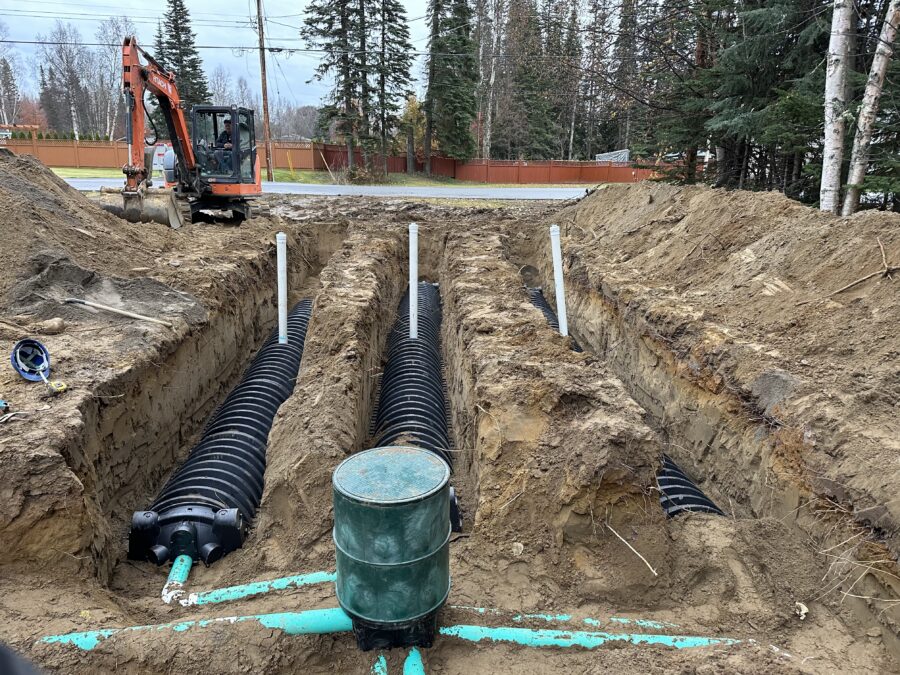
Frequently Asked Questions
Tank pumping, septic inspections, design, installation & maintenance
Septic Tank Pumping
How often should my septic tank be pumped?
Most septic tanks need to be pumped every 2 to 5 years, but this can vary based on the size of your tank, household size, and usage.
What signs indicate that my septic tank needs to be pumped?
Signs include slow drains, unpleasant odors, water pooling in the drain field, and sewage backups.
Can I pump my septic tank myself?
It’s highly recommended to hire a professional for septic tank pumping due to the need for specialized equipment and knowledge of disposal regulations.
What happens if I don’t pump my septic tank regularly?
Neglecting to pump your septic tank can lead to system failure, backups, and potential environmental contamination.
Is septic tank pumping covered by homeowners insurance?
Generally, septic tank pumping is considered routine maintenance and is not covered by homeowners insurance.
Septic System Maintenance
What routine maintenance tasks are essential for a septic system?
Essential maintenance includes regular pumping, avoiding flushing non-degradable materials, and reducing water usage to prevent overload.
How can I extend the lifespan of my septic system?
Regular maintenance, careful water use, and avoiding harsh chemicals can greatly extend your system’s lifespan.
Can using additives replace septic system pumping?
No, while some additives might help, regular pumping is necessary for removing solid waste and cannot be replaced by additives.
How does heavy rain affect my septic system, and what should I do?
Heavy rain can saturate the drain field, causing backups. Reduce water use during heavy rain and inspect the system afterward.
Septic System Inspection
How often should a septic system be inspected?
Septic systems should be inspected at least every 3 years, or annually if you have mechanical components like pumps.
What does a septic system inspection entail?
Inspections typically include checking the tank, pipes, and drain field for signs of leaks, blockages, or other issues.
Can I perform a septic system inspection myself?
It’s best to have inspections done by certified professionals to ensure a thorough evaluation and compliance with local regulations.
What common problems are found during septic inspections?
Common issues include sludge buildup, leaks, tree root intrusion, and improper drainage.
Why is a septic inspection important before buying a home?
An inspection can reveal potential issues and costs that could impact your decision to purchase and negotiate the price.
General
What factors are considered in designing a septic system?
Factors include soil type, property size, local regulations, water table, and household size.
How does soil type affect septic system design?
Soil type determines the absorption rate of the drain field, impacting the size and type of system needed.
Can a septic system be designed for a property with a high water table?
Yes, but it may require specialized designs like raised systems or advanced treatment technologies.
How do I know if my property needs a conventional or alternative septic system?
This is determined by soil conditions, space, environmental considerations, regional and municipal codes.
What is the process for getting a septic system designed and approved?
The process includes soil testing, designing the system to meet local requirements, and obtaining permits before installation.
How does a septic system work?
Wastewater flows from the house to the septic tank, where solids settle. The liquid effluent then flows to the drain field for natural filtration.
Can landscaping affect my septic system?
Yes, avoid planting deep-rooted trees near your system, and don’t place heavy objects over the drain field.
What maintenance is required for a septic drain field?
Maintenance includes avoiding planting trees nearby, not driving over the field, and monitoring for soggy areas or unusual grass growth.
Are there any water usage practices that can help maintain a healthy septic system?
Yes, spreading out laundry over the week, fixing leaks, and installing water-efficient fixtures can reduce the load on your system.
How does a garbage disposal affect a septic system?
Frequent use of a garbage disposal can increase the amount of solids in the tank, potentially requiring more frequent pumping.
Can I build a structure over my septic tank or drain field?
No, building over these areas can restrict access for maintenance and potentially damage the system.
What is the expected lifespan of a septic system?
With proper maintenance, a septic system can last 25 years or more, depending on usage and environmental factors.
What should I do if my septic system begins to fail?
Reduce water use immediately and contact a septic system professional for an assessment and necessary repairs.
Ignoring signs of failure can lead to more extensive damage and higher repair costs.
How can I find a reputable septic service provider?
Look for licensed, experienced professionals with good reviews and ask for recommendations from local health departments.
What’s the difference between a septic tank and a cesspool?
A septic tank processes and separates waste, while a cesspool is a pit that collects wastewater without treatment.
Customer Reviews
GET EXPERT SEPTIC HELP TODAY
Send us a message we’ll respond fast